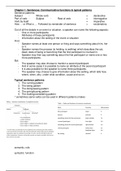Chapter 1: Sentences: Communicative functions & typical patterns
Sentence patterns:
Subject - Whole verb = declarative
Part of verb - Subject - Rest of verb = interrogative
Verb by itself = imperative
How … or What a …. Followed by remainder of sentence = exclamatory
Out of all the details in an event or situation, a speaker can name the following aspects:
- One or more participants
- Attributes of these participants
- Information about the setting of the event or situation
First:
- Speaker names at least one person or thing and says something about him, her
or it.
- Speaker names the process (is holding, is walking) which describes the act,
deed, state of being or becoming that the first participant is involved in.
- Speaker may then say something about the first participant or name one or two
more participants.
But:
- The speaker may also choose to mention a second participant
- And in some cases it is possible to name an attribute of the second participant
- It is also possible for the speaker to name three participants
- The speaker may choose to give information about the setting, which tells how,
where, when, why, under what condition, cause and so on.
Typical sentence patterns
1. The running pattern
2. The being pattern
3. The doing/seeing pattern
4. The giving/buying pattern
5. The making/considering pattern
^ sometimes same verbs can be used in different patterns (make)
semantic: role
syntactic: function
, Chapter 2: Sentences: Simple, compound and complex
Sentence = derived from Latin ‘sententia’ = ‘feeling’ or ‘opinion’
➔ In fields of grammar: ‘an utterance that expresses a feeling or opinion’
➔ More technical definition:
‘a grammatically self-contained speech unit consisting of a word, or a
syntactically related group of words that expresses an assertion, a question, a
command, a wish, or an exclamation, which in writing usually begins with a
capital letter and ends with a period, question mark, or exclamation mark.’
A grammatically complete sentence expresses at least one complete whole event or
situation with a subject and predicate.
- Some sentences consist of only one clause.(hoofdzin) (also expresses a whole
event or situation with a subject and predicate)
- A sentence may also consist of two or more clauses
Two general types of clauses
- Independent / main clauses
o Those that form a meaningful unit by themselves
- Subordinate / dependent clauses
o Those that cannot stand on their own because they function as a
constituent (subject, object, etc.)
Sentence types (degrees of complexity)
1. Simple sentences
o Consists of one main clause only (doesn’t mean the sentence is short)
o Because, if, who
2. Compound sentences
o Consists of two or more main clauses (can both stand on their own)
o The clauses have a fixed order, so they cannot be moved without
changing their meaning
▪ Coordinate conjunctions: and, but, or, nor, for, so, yet
▪ Correlative conjunctions, both … and, not only … but also, (n)either … or
▪ Semi-colon (;) between the main clauses
• often followed by therefore, besides, similarly = conjunctive
adverb
• unlike a coordinate conjunction, a conjunctive adverb can be
moved within the second clause
3. Complex sentences
o Contains at least one full dependent clause with its own subject and predicate
▪ Dependent clause: clause that starts with a subordinator.
• Subordinator: because, although, if, who, where, when, that, etc.
- Difference compound and complex = in a compound sentence, both parts are really
just simple, independent sentences. In a complex sentence, the dependent clause
cannot stand on its own and functions as a constituent (subject, adverbial, or attribute)
of the main clause, or in some cases it is only part of another sentence constituent
o 1st kind of dependent clause functions as adverbial (bijwoordelijke bepaling)
▪ If you are not sure whether a clause functions as adverbial, you can try
moving it as adverbials may occupy different positions in a sentence






